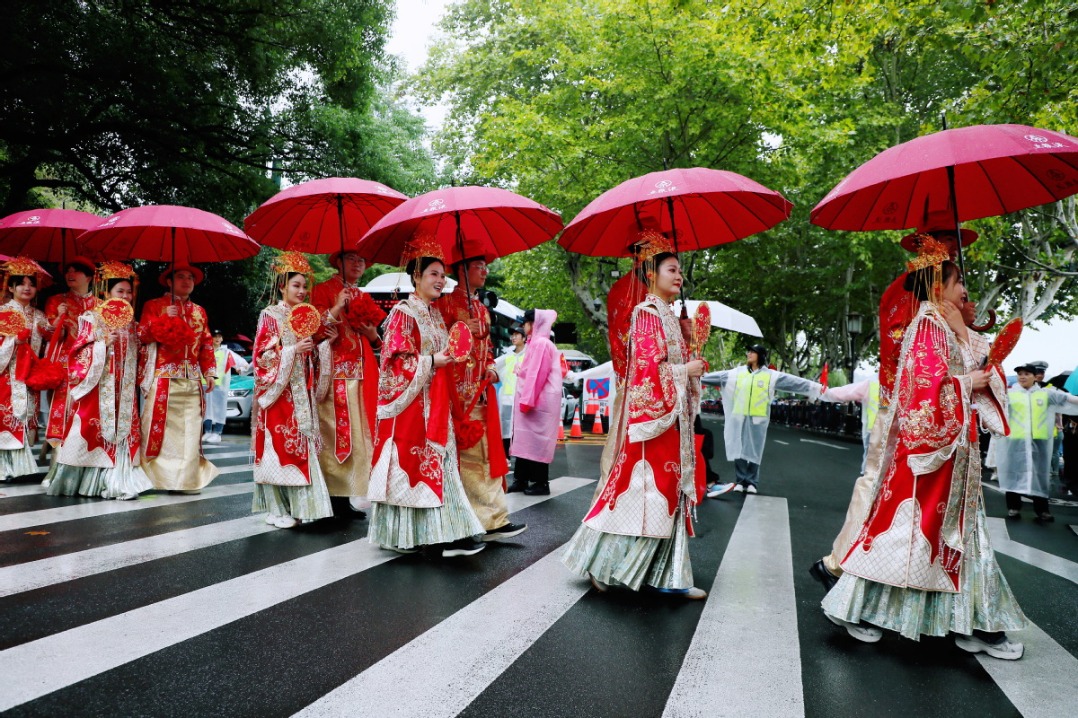Shandong sees major benefits from intangible cultural heritage law
NPC inspection tour finds traditions strengthened, but legal revisions may be needed


Innovative patterns
Facilitated by the law, new methods to utilize intangible cultural heritage items have also expanded across Shandong to more effectively pass on traditional skills.
According to Wang Lei, head of the provincial culture and tourism bureau, many living heritages are now being better utilized and developed in local industries, educational research and tourism.
"Utilization has also played a bigger role in advancing our local economic growth and rural vitalization," she said.
Cai Xiufang, an inheritor of wood carving, is introducing innovations to the traditional craft.
In the 1990s, she married and moved to Lizhuang village in Caoxian county, Heze. To increase her family's income, she began combining her carving skills with local traditional woodworking. She created many furniture pieces such as square tables, wardrobes and tea tables adorned with carved flowers and birds, which attracted buyers.
Due to the time-consuming and labor-intensive nature of hand-carving, Cai found it too hard to handle the soaring number of orders on her own. Therefore, she started recruiting villagers to join her team of carvers.
With more workers, Cai opened her own company, which paved the way for her to develop the woodcarving industry.
So far, the number of artisans trained by Cai has exceeded 300, and her company's woodcarving works are not only popular in China, but also exported to foreign countries.
Data provided by Cai showed that the online sales revenue of the corporation surpassed 6 million yuan ($828,084) in 2022.
"The carving skills have enriched me, and have also helped me live a better life," said Li Yan, a villager who was Cai's apprentice and now works for the company.
Now, there are over 1.2 million enterprises or operators engaged in intangible cultural heritage in Shandong, with annual output value exceeding 160 billion yuan, providing employment opportunities for more than 4 million people, according to Wang, from the culture and tourism bureau.
In addition to leveraging living heritage to drive local economic development, she said Shandong has also designated 100 provincial-level intangible cultural heritage education bases for research and to promote study tours.
Huayang Nianhua, a living heritage campsite in Tai'an, has been open to
the public since October.
"We've provided classes for visitors, especially students, to learn about the histories behind our local intangible cultural heritage items, such as paper cutting, and making pancakes and tofu," said Liu Bing, who is in charge of the base.
"We've also invited inheritors to share their stories here to spark the younger generation's interest and help promote cultural education," Liu said.
The campsite has a 14,000-square-meter learning experience center, an 8,000-sq-m accommodation area and a 6,000-sq-m restaurant and practical base, which cater to 2,000 people for short-term study and research. Since its opening, it has had 15,000 visits and organized more than 30 special activities for participants, he added.
Deng Yunfeng, vice-governor of Shandong, lauded the methods used to develop living heritage items in recent years, and called for more social organizations to support the building of venues or workshops as well as development diversity.























